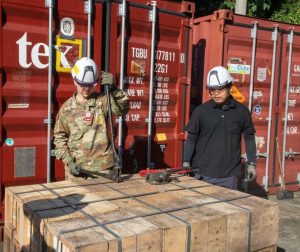As graduate students and postdocs pursue careers beyond the tenure track, they are looking for opportunities to develop skills for a variety of posts within the research ecosystem, in areas including research proposal development, student support, academic administration, science program management, career coaching, manufacturing best practices, science communication and more.
This need gives rise to a meta postdoc, one that is explicitly aware of their unique research expertise as well as of the gaps in their skill set. The meta postdoc is focused on acquiring those key skills to transition into research-adjacent careers.
In this article, two young scientists seeking research-adjacent careers share their experiences as they sought out missing pieces in their career preparation, and their supervisors share how their institutions have developed funded fellowship programs with extensive mentoring components to support the scientists’ unique needs.
In these examples, both the emerging researcher and the institution stand to benefit. The young researcher benefits as they develop skill sets not usually emphasized in a traditional graduate school program or postdoc experience, while being paid a living wage that values their education and research training. The institution benefits from dedicated, full-time employees who can carry out important projects that might otherwise go uncompleted due to lack of time, money and/or staff.
Example No. 1
Jessy Martinez earned his doctoral degree in molecular, cellular and developmental biology at the University of Michigan. He knew early in graduate school that he was interested in something other than the traditional tenure-track position. He attended career workshops, and Michigan’s Research Operations, Management and Strategy (ROMS) Fellowship piqued his interest. The fellowship allows him two years to explore different administrative careers, and he became interested in research administration.
In his first year, Jessy went through four to six weeklong rotations working on small projects in different research support units. Now, in his second year, he is focusing on short- to long-term impact projects, surveying writing support resources for graduate students and postdoctoral scholars, exploring how to use generative AI as a digital assistant for new graduate students and conducting a postdoc climate survey.
Jessy reports to Kelly Kennaley, the project manager for strategic research initiatives in the Office of Research at the University of Michigan Medical School. Kelly, a member of the first ROMS cohort, shared that executive-level support has allowed the program to flourish and consistently support two fellows in each cohort since 2019. The program aims to teach young researchers unique skills in research administration and gives the institution additional staffing resources to conduct special projects. However, the ROMS fellows are not limited to projects within the research office. The program allows for highly individualized experiences in the second year, after fellows have had a year of a well-rounded training experience in various research offices, such as grant services, core facility management or research compliance.
The program includes a fair bit of mentoring to ensure that the young researcher can move quickly into different settings in their first year. The ROMS program also requires quarterly progress reports to review goals and align them with the scientist’s project portfolio so that career skill development remains on target. Fellows have access to the research division’s leadership team to discuss career trajectories and obtain career advice, and program administrators meet with fellows frequently to build résumé-writing, cover letter–writing and interviewing skills. The goal is for each fellow to find a position before their fellowship ends.
The decision to become a ROMS fellow should be intentional, as a return to previous research work may prove difficult. An ideal candidate would have extensively and meticulously explored this career transition.
Example No. 2
Jennifer Ocasio earned her doctoral degree in neurobiology and neurosciences from the University of North Carolina at Chapel Hill. She moved into a traditional postdoctoral scholar position at St. Jude Children’s Research Hospital, where, in her second year, she co-developed the St. Jude Summer Plus Student Training in Academic Research Topics program. In this program, she designed curricula for undergraduate students to develop laboratory, science communication and professional development skills, with a focus on building community. This experience was a turning point for her as she was beginning to realize that she really enjoyed mentoring and working with students far more than other aspects of a tenure-track career. She saw that she could dedicate her full-time efforts to mentoring and supporting students.
Knowing she needed to better align her skills with her new career path, she applied for the Career Advancement Program (CAP) Fellowship at St. Jude, a 12- to 18-month fellowship that offers an experiential learning opportunity and prepares postdocs who have completed their research training to transition into research-adjacent careers.
Jennifer reports to Sally McIver, senior program director of research education and training at St. Jude. Sally saw a need to support postdocs who are at St. Jude to conduct research but are unclear about their future career tracks. While many postdocs claim to be interested in academic tenure-track positions, Sally saw that they indicate in surveys they are also interested in other careers, but their timelines are nebulous. She sought out ways to provide postdocs with transferable skills and career advising to help lead them toward an intentional career decision. Once decided, they have an option to apply for additional career-specific training through the supported postdoctoral CAP fellowship.
These full-time fellowship positions provide training and mentorship in areas including academic administration, science program management, scientific communication, good manufacturing practices and undergraduate research and education. Postdocs apply for their CAP area of interest approximately three to six months prior to the end of their research training, are interviewed by Sally and the host department, and selected based on their existing skill set, interest and alignment of career development goals with CAP fellowship opportunities. Once accepted into the program, they complete a competencies assessment (with input from their mentor/supervisor) and create a CAP fellowship timeline (one to two years) that includes project deliverables, specialized training and professional networking opportunities. Together, they re-evaluate those competencies and goals every three months. The goal, as with the ROMS program, is to support fellows to be career-ready by the time they finish.
These two examples have several commonalities. Jessy and Jennifer both intentionally pursued other career opportunities, beyond a traditional tenure track. They sought out programs that would provide them with training to meet the skill requirements of their aspirational posts. Their fellowships provided them with unparalleled mentoring; they are well poised to enter the workforce. Both the University of Michigan and St. Jude Children’s Research Hospital deliberately and strategically coordinated many units on campus to create the structure and the funding for the fellows to be successful. These two examples serve as a source of inspiration for young doctorates who want to pursue careers in research-adjacent spaces and for institutions that want to better prepare young doctoral researchers for careers beyond the tenure track.
Ivonne Vidal Pizarro (she/her) is the assistant dean for the Office of Postdoctoral Affairs at the University of Tennessee at Knoxville. She established the Southeastern Institution Postdoc Office Leaders, which meets monthly to provide support and information to those who lead postdoc offices. Vidal Pizarro is a lifetime member of the Society for the Advancement of Chicanos and Native Americans in Science. She is also a member of the National Postdoctoral Association and the Graduate Career Consortium, an organization that provides an international voice for graduate-level career and professional development leaders.








